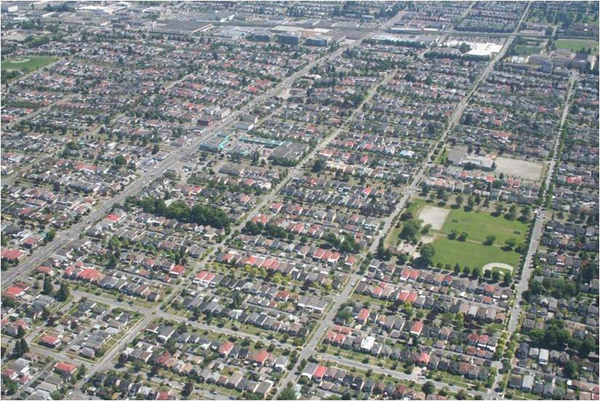Vancouver has morphed into a machine for screwing millennials.
Unless we do something drastic, we will have deprived that generation of productive 20- to 35-year-olds the ability to own a house in Vancouver. If you think that's no big deal, consider this: each person shut out of affordable home ownership in Vancouver is consigned to the screwed side of the increasingly widening global wealth divide.
That's right. Vancouver's perverse real estate market is a textbook example of the suddenly fashionable realization that the rich are getting way richer at the expense of an evaporating middle class. Further down I'll propose how Vancouver could instead be a laboratory for at least partly reversing that trend by enacting a simple and straightforward policy change.
But first, let's look at where we've arrived and why.
Unlike Vancouver's baby boomers, their children and grandchildren do not have, and apparently will never have, the money to buy a house in Vancouver, not in its leafy single-family residential neighbourhoods anyway. The trend for this generation is to either rent for life, or move out to the greener fields of the suburbs to buy. The burbs beckon particularly when the urge to breed strikes. Residents 15 years or younger constitute a 25 per cent greater share of Surrey's population than they do of Vancouver's, and this disparity is increasing with time.
It is often pointed out that half of the residents of the City of Vancouver are renters, so homeownership should not be the goal, affordability should. Thus the city's recent efforts to increase the production of new purpose-built rental units, the production of which has been stalled since the 1980s when tax laws benefiting owners of rental properties were repealed and new ones benefiting the owners of condominiums were enacted. But despite the fact that Vancouver's population is half renters, a possibly propitious situation, this disguises the fact that in previous generations the status of renter was, for many, a temporary not a permanent condition. Increasingly it looks as if renting is to be a permanent condition for middle-class Vancouver residents, at least for those who don't leave the city.
That factor is but one in a perfect storm making Vancouver a poster city for what drives wealth disparity.
The crappy salaries
As Andy Yan, the researcher and urban planner at Bing Thom Architects has pointed out, college graduates who stay in Vancouver will likely make significantly less than they would in any other major city in Canada, while the cost of owning a single family home is higher than in any other Canadian city, and a ridiculous five times higher than in Montreal. Certainly an immediate effort to attract high paying jobs to the city (any jobs, resource based or green) is to be applauded. But it stretches the imagination to expect family income that has been stuck at around $60,000 for 25 years to move very quickly, if at all.
Why? Because wages have been stagnating in every developed country for decades and particularly since the recent global financial crisis. Since 1980 there has been a steady decline in the percentage of increased GNP that goes to those making in the bottom 90 per cent of incomes. That's basically all of us. This most recent "jobless recovery" was one that, for the first time in recent history, saw an absolute decline in the money available to the lowest 90 per cent of incomes. This means that not just all of the money gained in the recovery went to the rich, but they got some of the money that was previously in the hands of everyone else too.
Welcome (back) to Late-Stage Capitalism
Is this trend likely to change? Barring some global calamity probably not, at least not according to the rock star of 21st century economics, Thomas Piketty of the Paris School of Economics and author of the best selling book Capital in the Twenty-First Century. For those outside of academia it may seem odd to assign rock star status to an academic economist, but in this case it is merited. Google his name to confirm his status: almost four million results since he emerged last year from obscurity. What's all the fuss? He proved that rich get richer while the rest get poorer. This may seem obvious to most but until Piketty hit the scene nobody really had the numbers to prove it. He is the first economist to access 300 years worth of economic data to conclude that, all things being equal, those with money will continue to own more and more of everything.
The math is simple. If you have $100 million and it returns five per cent you get five million cash a year. If you don't take it out as income and roll it over into more income producing investments instead, you don't lose it to income taxes. If you do this year after year after year it only takes 16 years to end up with $200 million, and after another 16 years $400 million. If you only have one child to leave it to they can continue the game and double it again in 16 more years. Within a reasonable amount of time you are a billionaire and all you do with your time is look for more assets to buy, which will themselves return your dependable five per cent, forever. And when you think of assets to buy in the carrying out of this process, there really isn't a big selection. There are stocks, bonds and real estate. That's pretty much it.
It doesn't take a PhD in economics to see that if you are one of these fortunate few playing the game, eventually you will own everything in the world, or at least you and the 100,000 people on the planet like you would. And in a global slow growth period where returns on investments outpace global GNP growth (which lately has been far lower than five percent in all developed countries), the economy can't grow fast enough to produce new wealth to mitigate this trend. Eventually more and more wealth ends up in fewer and fewer hands until a limited number of people own pretty much everything -- including your house.
We've been here before
This sounds apocalyptic but it's not unprecedented. This was the way the world worked back when Jane Austen was writing Pride and Prejudice. Anyone in that world who had no capital (in those days capital was mostly in the form of farmland) was only eking by -- living in rented cottages and getting paid a wage only sufficient for meager meals and necessary clothes.
What Piketty makes alarmingly clear is that this condition might have endured forever if not for the sequential catastrophes of the First World War, the Depression, and then the Second World War. This 40-year period of disruption had the effect of undercutting the inevitably inequitable distribution of wealth by basically destroying it. It was destroyed by the bombs that fell on factories, by the inflation that made bonds worthless, and by the emergency taxes on wealth that most nations enacted to insure their survival. All of these catastrophes had the oddly salubrious effect of giving an emerging middle class a larger and larger share of a nation's total wealth, mostly in the form of home ownership. But sadly this condition only persisted between 1950 and 1980, and has been largely reversed since the "Reagan/Thatcher Revolution."
Evidence? Today we have much lower tax rates on capital gains. Income tax rates on the very rich have fallen dramatically (from 90 per cent after the Second World War to around 40 per cent now). Calls for the elimination of inheritance taxes, our last real tax on perpetual wealth, are gaining more and more traction. Thus, a condition which we all took to be the bedrock of modern democracies, an enduring middle class (as defined by home ownership, an ability to raise a family, an affordable college education for your kids and a solid net worth as you approach retirement), and a shifting group of the rich (in that the middle class had a chance to get rich and the rich might not stay that way forever), appears to have been an ephemeral condition brought on by factors that we do not want to repeat.
Our drift toward a society not unlike that described by Jane Austen seems irreversible. If she lived in Vancouver today, perhaps her next book would be titled Sense of Inevitability.
Back to the housing question
What has all this to do with housing and Vancouver's financially overstressed millennials? Everything.
With the world awash in cash those who have it are desperate for places to put it. The amount of money coming in to this small group per year is staggering, and the world simply does not have many places to park it. Bonds, stocks and real estate. That's it. And with bond returns at a 40-year low, the ten-year return on stocks still under five per cent even after recovery, well, what does that leave you? It leaves the house on your block. The ten-year appreciation for single-family real estate on the west side of Vancouver was an astonishing 300 per cent.
Think about it. If you live somewhere like Shanghai or Manila or Minsk, and you need to park one or two million dollars, what are you going to do? You are going to park it in real estate. You park it in nice places: Singapore, Sydney, London, New York, San Francisco, or -- you guessed it -- Vancouver. It doesn't make a bit of difference to you if the house prices bear zero relation to the average income of those who toil at ordinary jobs and who have to try to live here.
The real estate markets in such cities are more tied to global investors' aims than local wage earners' capacities. You, dear Vancouver college graduate, are literally out in the cold.
A proposal
What to do? Well, the fundamental trend seems unlikely to change so we can't hold our breath for that. Piketty suggests that absent another global war, depression or French revolution, the next few decades appear headed for some sort of end-state economy where those with the money buy up most of the world's capital assets while everyone with an actual job gets squeezed out of the market. The only suggestion he can come up with is a global tax on wealth, and good luck with that one.
But while we wait for the revolution there is one thing that might help Vancouver millennials capitalize on their last chance at a piece of the global wealth pie. Carve up Vancouver into smaller pieces.

Right now the average single-family unimproved bungalow in Vancouver is valued at about $1.2 million (and most of that is land value). Given that the average family income in this city is around $60,000, this is about five times too expensive to buy because the rule of thumb is that average house should cost four times the average family income.
A simple solution emerges. Split that average home into smaller more affordable parts. Currently subdividing homes into separate ownerships is prohibited in RS-1 zoned areas, and RS-1 zoning covers over 60 per cent of all residential lands in the city. But if you could split a single family bungalow in Killarney or Dunbar into five units of various sizes, the purchase price would be, in simplified terms, $250,000. A figure much more approachable for families earning the average wage.
Of course there would be reconstruction costs associated with this change in tenure: new bathrooms, dormers, additions, more spacious basements, lane houses etc. But at even gut rehab prices of $150 per square foot that adds roughly $100,000 to the price of each of the five units -- $350,000 is (with gritted teeth) doable.
You need great architects
Architectural skill is required to insure such alterations respond both to existing architectural and neighbourhood context. Happily we have scores of examples of projects where this has been achieved. In the Kitsilano district between 10th and Cornwall and Alma and MacDonald, a special zoning district to do something quite similar has been in place since the mid-1990s. There, single family homes can be "stratified" into three individually owned units per parcel. The results are almost universally quite attractive. The stipulation for adding this density has been a requirement that, even while in many cases more than doubling the habitable square area of the structure, the existing structure must be reused. This tends to result in a proliferation of dormers, additions, side houses and lane houses added to the house and site.

I have had the good fortune of living in that area for 20 years and have made a study of these changes. The most important change? The area has become more and more alive as the decades pass. Unlike Coal Harbour and Dunbar, two districts where it seems the vampires have struck in the night, this part of Kits retains its children, and its life. The local schools are full, the resident demographic ranges in age, and in comparison to Dunbar anyway, in income. Sadly this area has also been priced out of the range of the average millennial, but it would not be such a stretch if the city took the next step of allowing four and then five strata units per site.
It's true that squeezing three units out of a 3,200 square foot lot is a lot easier than squeezing five units out of the same sized lot. But it's not impossible. Good architects can do it. And the need seems desperate. The alternative is that the next generation will not be able to compete for space in the large majority of this city, and will never have the option of locking down a share of the wealth pie in time for it to do them any good later in life.
We really need a strategy that lets our children compete with those who can afford a $1.2 million home. Today's millennials, by and large, cannot.
The fact that this strategy will reinvigorate parts of the city that seem to be losing their vitality -- with aging residents, emptying schools, empty buses and shops without customers -- seems a huge bonus as well. ![]()
Read more: Housing, Municipal Politics
















Tyee Commenting Guidelines
Comments that violate guidelines risk being deleted, and violations may result in a temporary or permanent user ban. Maintain the spirit of good conversation to stay in the discussion.
*Please note The Tyee is not a forum for spreading misinformation about COVID-19, denying its existence or minimizing its risk to public health.
Do:
Do not: